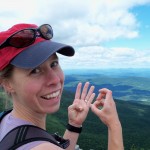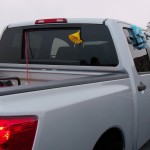I used to think all scientists wore white labcoats and worked with chemistry equipment.

This is my latest experimental set up.
Yes, that’s a rental truck with a bunch of instruments stuck in the back. I spent a week on the Big Island of Hawaii measuring different molecules of water and pollutants to understand atmospheric mixing.
Since becoming a graduate student at the University of Colorado, I’ve learned a lot about the breadth of science and its diverse methodologies. But, I’ve also learned about science’s limitations. Climate change is an interesting example.
Science can certainly tell us that our use of fossil fuels is changing key aspects of our planet. And, science can tell us to expect changes in natural resource availability as a result (living on the Colorado River system, water comes to mind). But science can’t tell us precisely which mitigation or adaptation strategies we should put in place. That depends very much on our valuation of costs and benefits.
So I’m off to summer school (in Switzerland!) to learn a bit more about evaluating climate response strategies in terms of dollars and cents and see how folks on the other side of the Atlantic are preparing to tackle the socio-economic questions we will all need to face regarding the global climate system.

